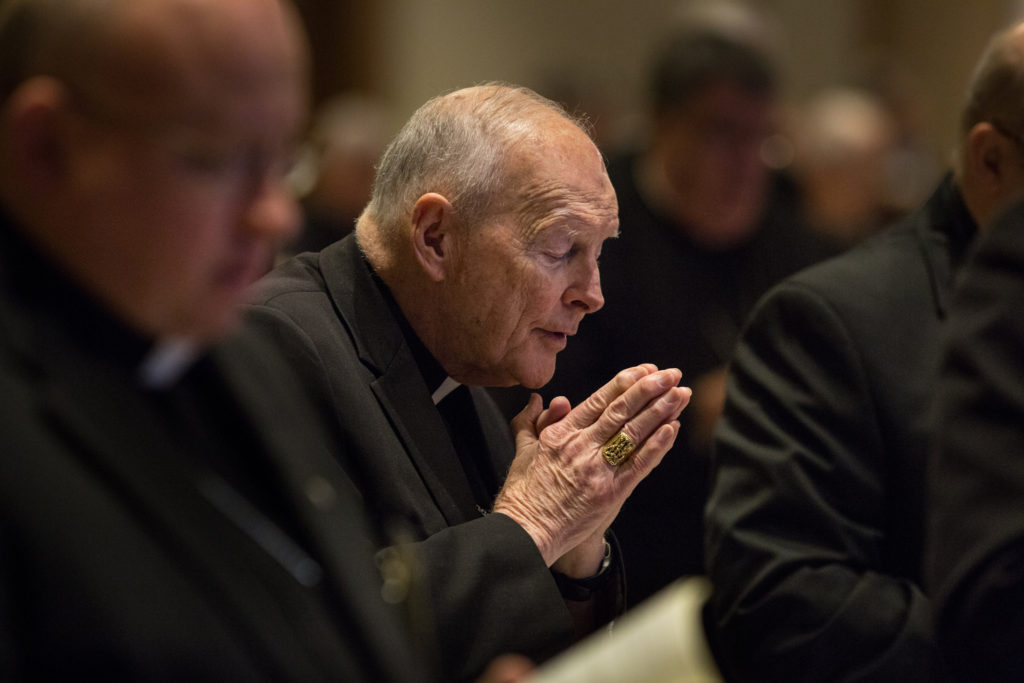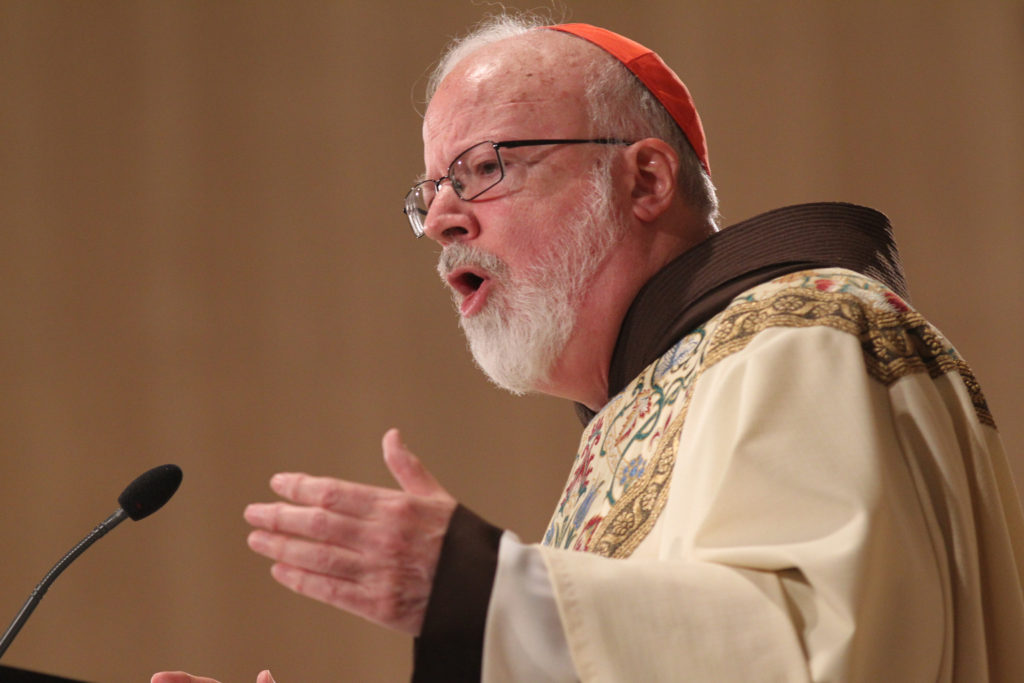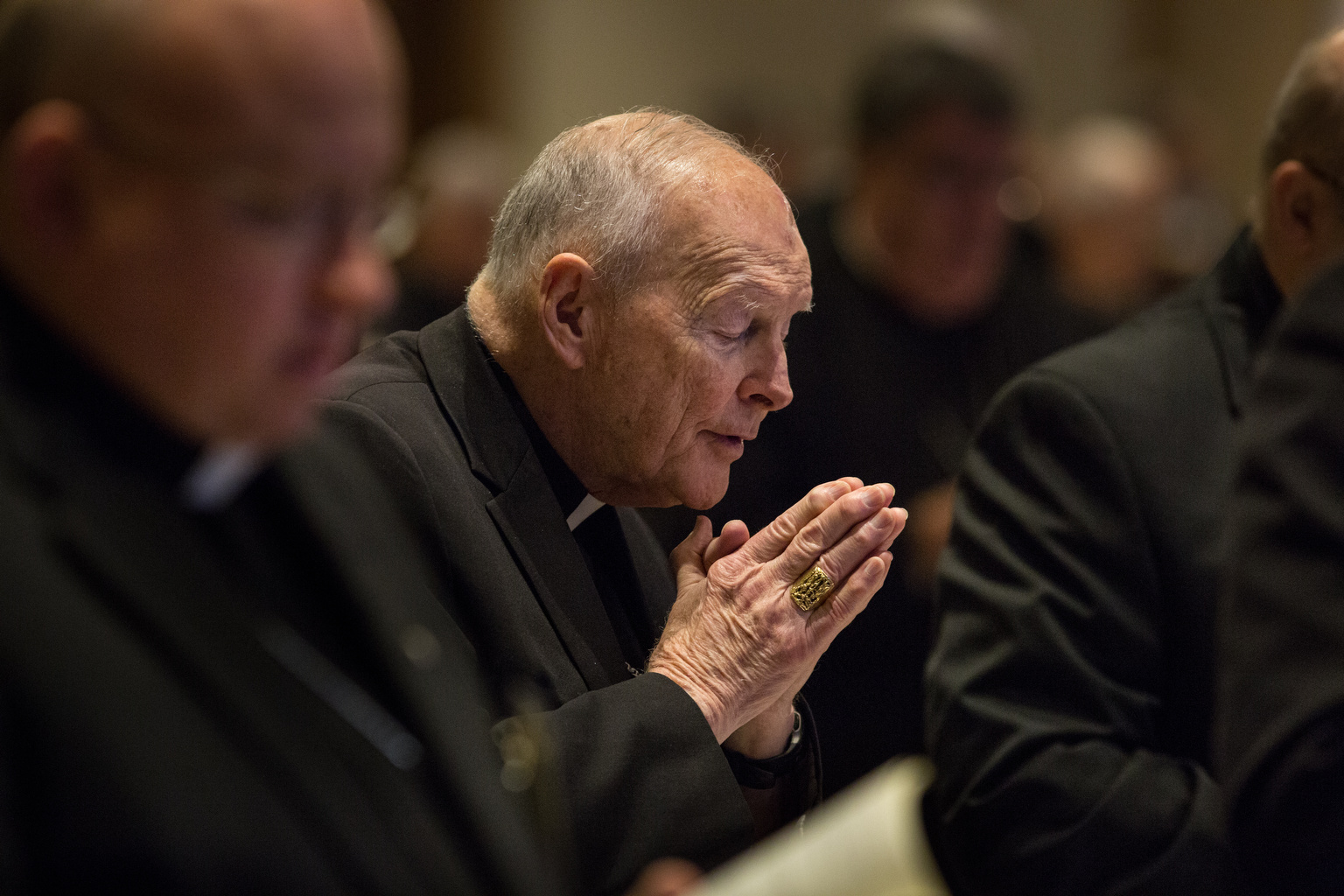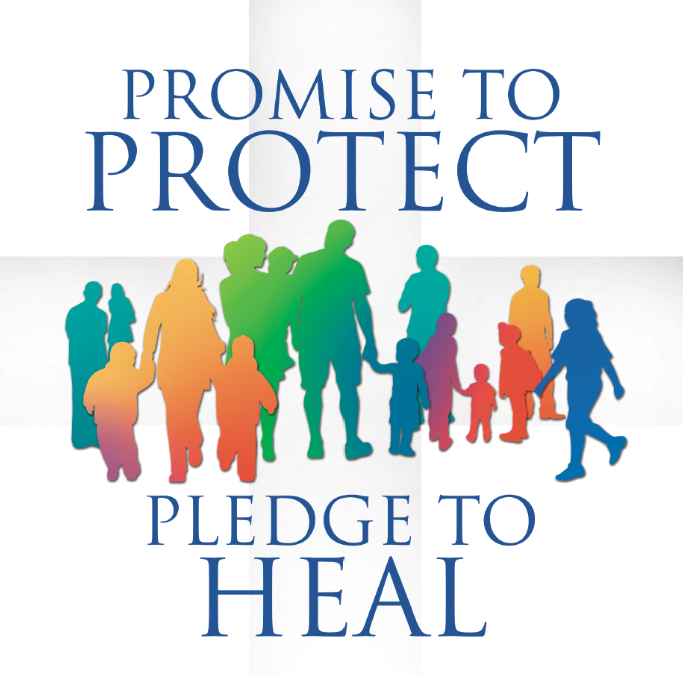
By Cindy Wooden
Catholic News Service
Office of Child and Youth Protection
The Diocese of Phoenix encourages anyone who has been a victim of child sexual abuse by any employee of the Roman Catholic Church to please come forward by contacting the Office of Child and Youth Protection.
VATICAN CITY (CNS) — Pope Francis has accepted the resignation from the College of Cardinals of Cardinal Theodore E. McCarrick, retired archbishop of Washington, and has ordered him to maintain “a life of prayer and penance” until a canonical trial examines accusations that he sexually abused minors.
The announcement came first from the U.S. Conference of Catholic Bishops and a few minutes later from the Vatican press office.
The press office said July 28 that the previous evening Pope Francis had received Cardinal McCarrick’s letter of “resignation as a member of the College of Cardinals.”
“Pope Francis accepted his resignation from the cardinalate and has ordered his suspension from the exercise of any public ministry, together with the obligation to remain in a house yet to be indicated to him, for a life of prayer and penance until the accusations made against him are examined in a regular canonical trial,” the Vatican statement said.
In late June, Cardinal McCarrick, the 88-year-old retired archbishop of Washington, said he would no longer exercise any public ministry “in obedience” to the Vatican after an allegation he abused a teenager 47 years ago in the Archdiocese of New York was found credible. The cardinal has said he is innocent.
In the weeks that followed the announcement, another man came forward claiming he was abused as a child by Cardinal McCarrick and several former seminarians have spoken out about being sexually harassed by the cardinal at a beach house he had.
Although unusual, withdrawal from the College of Cardinals in such circumstances is not unheard of. Just 10 days before then-Pope Benedict XVI retired in 2013, Scottish Cardinal Keith O’Brien announced he would not participate in the conclave to elect Pope Benedict XVI’s successor because he did not want media attention focused on him instead of the election of a new pope.
Pope Benedict XVI had accepted the cardinal’s resignation as archbishop of St. Andrews and Edinburgh after reports that three priests and a former priest had accused the cardinal of “inappropriate conduct” with them going back to the 1980s.
One week after the conclave that elected Pope Francis, the Vatican announced the new pope accepted Cardinal O’Brien’s decision to renounce all “duties and privileges” associated with being a cardinal. He died March 19.
Cardinal Daniel N. DiNardo, archbishop of Galveston-Houston and USCCB president, thanked the pope for accepting Cardinal McCarrick’s resignation from the College of Cardinals.
In a July 28 statement he said: “I thank the Holy Father for his leadership in taking this important step. It reflects the priority the Holy Father places on the need for protection and care for all our people and the way failures in this area affect the life of the Church in the United States.”

In a statement issued late July 24, Boston Cardinal Sean P. O’Malley said “a major gap still exists” when it comes to the Catholic Church’s policies on sexual abuse and conduct as it pertains, not just to priests, but in cases of accusations against cardinals and bishops, in a clear reference to the allegations made against Cardinal McCarrick.
While the Church in the United States has clear procedures when it comes to investigating such accusations against priests, “we must have clearer procedures for cases involving bishops,” wrote Cardinal O’Malley, who is a part of Pope Francis’ nine-member Council of Cardinal advisers.
It was Cardinal O’Malley who took the helm of the Boston Archdiocese — where the national sexual abuse scandal erupted in 2002 — after the resignation of Cardinal Bernard Law, who had allegedly covered up many of the abuses.
The Church needs a strong and comprehensive policy “to address bishops’ violations of the vows of celibacy in the cases of criminal abuse of minors and in the cases involving adults,” the statement said.
He acknowledged what the Archdiocese of New York called “a credible and substantiated allegation” involving a minor and Cardinal McCarrick when the prelate was a priest in that archdiocese, and its investigation of a second incident there also involving a minor and then-Fr. McCarrick.
“These cases require more than apologies,” he says, adding that any new report of abuse “creates doubt in the minds of many that we are effectively addressing this catastrophe in the Church.”
Cardinal O’Malley called for “three specific actions” to immediately address allegations against Cardinal McCarrick of sexual abuse of minors and “sexual improprieties” with seminarians, starting with “a fair and rapid adjudication of these accusations.”
Second, there must be “an assessment of the adequacy of our standards and policies in the Church at every level, and especially in the case of bishops,” he said. “And third, communicating more clearly to the Catholic faithful and to all victims the process for reporting allegations against bishops and cardinals.”
“Failure to take these actions will threaten and endanger the already weakened moral authority of the Church and can destroy the trust required for the Church to minister to Catholics and have a meaningful role in the wider civil society,” Cardinal O’Malley said.
The cardinal, who is president of the Pontifical Commission for the Protection of Minors, issued the statement in response to articles in the national media over the past several days that “have reported accusations of Cardinal Theodore McCarrick’s sexual improprieties with several adults and his criminal violations of the sexual abuse of minors.”
“These alleged actions, when committed by any person, are morally unacceptable and incompatible with the role of a priest, bishop or cardinal,” Cardinal O’Malley said.
Cardinal O’Malley added: “In this moment there is no greater imperative for the Church than to hold itself accountable to address these matters, which I will bring to my upcoming meetings with the Holy See with great urgency and concern.”
He also addressed news reports that say he received a letter from Dominican Father Boniface Ramsey on June 25, 2015, about Cardinal McCarrick’s conduct with seminarians. He said he did not “personally receive” the correspondence and a review “at the staff level” did not determine that its contents were under “the purview of the (pontifical) commission or the Archdiocese of Boston.”
“In every instance of claims made by victims of sexual abuse, whether criminal violations or the abuse of power, the primary concern must be for the victim, their family and their loved ones,” Cardinal O’Malley said.








